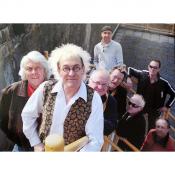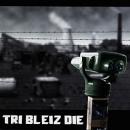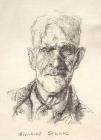Elle est née d'une ferme tout en haut d'un rocher
Cette ville que j'ai tant, tant et tant aimée
Du lavoir à l'hiver, de l'église à l'été,
Les siècles s'enchaînaient aux années...
Ils avaient les moissons pour vacances l'été
Et les femmes saignaient sur le lin des rouets
Et la pluie tombait blanche sur les toits ardoisés
Dans la ville que j'ai tant aimée
On y venait de Nantes les dimanches d'été
Avant qu'elle ne soit grande quand notre siècle est né
Chemises et robes blanches les jardins ouvriers
Fleurissaient sous des ciels de pommiers
C'est la fin de l'enfance et nous avons dansé
Dans l'école un dimanche, il y a seize années
Le soleil a brillé sur les toits ardoisés
De la ville que j'ai tant aimée
Et les filles riaient et les hommes buvaient
La ville était adulte et les arbres chantaient
Et puis une aube grise un matin s'est levée
L'herbe rouille et l'aubier est gelé
Ils ont tout brisé, balayé et brûlé
Ils ont tout interdit tout arraché
Et la pluie tombe noire sur les toits ardoisés
De la ville que j'ai tant aimée
J'y ai vu un gamin en costume arlequin
Peindre un arbre bleuté dans un étang gelé
Nous avons su apprendre aux enfants à rêver
Dans la ville qu'ils ont tant aimée.
Cette ville que j'ai tant, tant et tant aimée
Du lavoir à l'hiver, de l'église à l'été,
Les siècles s'enchaînaient aux années...
Ils avaient les moissons pour vacances l'été
Et les femmes saignaient sur le lin des rouets
Et la pluie tombait blanche sur les toits ardoisés
Dans la ville que j'ai tant aimée
On y venait de Nantes les dimanches d'été
Avant qu'elle ne soit grande quand notre siècle est né
Chemises et robes blanches les jardins ouvriers
Fleurissaient sous des ciels de pommiers
C'est la fin de l'enfance et nous avons dansé
Dans l'école un dimanche, il y a seize années
Le soleil a brillé sur les toits ardoisés
De la ville que j'ai tant aimée
Et les filles riaient et les hommes buvaient
La ville était adulte et les arbres chantaient
Et puis une aube grise un matin s'est levée
L'herbe rouille et l'aubier est gelé
Ils ont tout brisé, balayé et brûlé
Ils ont tout interdit tout arraché
Et la pluie tombe noire sur les toits ardoisés
De la ville que j'ai tant aimée
J'y ai vu un gamin en costume arlequin
Peindre un arbre bleuté dans un étang gelé
Nous avons su apprendre aux enfants à rêver
Dans la ville qu'ils ont tant aimée.
Lingua: Italiano
Versione italiana di Riccardo Venturi
LA CITTÀ CHE HO TANTO AMATO
È nata da una fattoria in cima a una scogliera
Questa città che ho tanto, tanto e poi tanto amato.
Dal lavatoio all'inverno, dalla chiesa all'estate,
I secoli s'incatenavano agli anni...
Avevano le messi come vacanze estive
E le donne sanguinavano sul lino dei telai,
E la pioggia cadeva bianca sui tetti d'ardesia
Della città che ho tanto amato.
Ci si veniva da Nantes le domeniche d'estate
Prima che diventasse grande, quando il nostro secolo è nato
Camicie e vestiti bianchi, i giardini operai
Fiorivano sotto dei cieli di meli.
È la fine dell'infanzia, e abbiamo ballato
A scuola una domenica, sedici anni fa
Il sole è brillato sui tetti d'ardesia
Della città che ho tanto amato.
Le ragazze ridevano, gli uomini bevevano
La città era adulta e gli alberi cantavano,
E poi, un mattino, s'è levata un'alba grigia,
L'erba arrugginisce e l'alburno è gelato.
Hanno spezzato tutto, spazzato e bruciato via tutto,
Hanno proibito tutto, strappato tutto
E la pioggia cade nera sui tetti d'ardesia
Della città che ho tanto amato.
Ho visto un ragazzino vestito da Arlecchino
Dipingere un albero di turchino in uno stagno gelato
Abbiamo saputo imparare ai bambini a sognare
Nella città che hanno tanto amato.
È nata da una fattoria in cima a una scogliera
Questa città che ho tanto, tanto e poi tanto amato.
Dal lavatoio all'inverno, dalla chiesa all'estate,
I secoli s'incatenavano agli anni...
Avevano le messi come vacanze estive
E le donne sanguinavano sul lino dei telai,
E la pioggia cadeva bianca sui tetti d'ardesia
Della città che ho tanto amato.
Ci si veniva da Nantes le domeniche d'estate
Prima che diventasse grande, quando il nostro secolo è nato
Camicie e vestiti bianchi, i giardini operai
Fiorivano sotto dei cieli di meli.
È la fine dell'infanzia, e abbiamo ballato
A scuola una domenica, sedici anni fa
Il sole è brillato sui tetti d'ardesia
Della città che ho tanto amato.
Le ragazze ridevano, gli uomini bevevano
La città era adulta e gli alberi cantavano,
E poi, un mattino, s'è levata un'alba grigia,
L'erba arrugginisce e l'alburno è gelato.
Hanno spezzato tutto, spazzato e bruciato via tutto,
Hanno proibito tutto, strappato tutto
E la pioggia cade nera sui tetti d'ardesia
Della città che ho tanto amato.
Ho visto un ragazzino vestito da Arlecchino
Dipingere un albero di turchino in uno stagno gelato
Abbiamo saputo imparare ai bambini a sognare
Nella città che hanno tanto amato.
Lingua: Inglese
La canzone originale, che può essere anche vista alla sezione dedicata a Phil Coulter assieme alla versione francese di Hugues Aufray. Come specificato nel commento al testo francese, i Tri Yann hanno veramente riscritto la canzone adattandola a Orvault e alla sua storia. Ma la canzone di Coulter è dedicata a Derry e riporta direttamente sia alla "Domenica di sangue" del 30 gennaio 1972, per la quale si veda, ovviamente, anche Sunday, Bloody Sunday degli U2, e all' "Operazione Motorman", l'occupazione militare inglese della medesima città, tra il luglio e l'agosto sempre del '72.
THE TOWN I LOVED SO WELL
Phil Coulter, 1973
In my memory I will always see
The town that I have loved so well.
Where our school played ball by the gasyard wall,
And we laughed through the smoke and the smell.
Going home in the rain, running down the dark lane,
Past the jail and down behind the Fountain.
Those were happy days in so many, many ways
In the town that I loved so well.
In the early morn, the shirt factory horn
Called the women from Creggan, the Mor and the Bog,
While the men on the dole played the mothers’ role,
Fed the children and walked the dog.
Well when times got tough they had just about enough
For they saw it through without complaining.
For deep inside was a burning pride
For the town that I loved so well.
There was music there in the Derry Air
Like a language that we could all understand.
I remember the day when I earned my first pay,
Playing songs in a small pickup band.
Well I spent my youth, and to tell you the truth
I was sad to leave it all behind me.
For I learned about life and I met me a wife
In the town that I loved so well.
Now when I returned how my eyes were burned
To see how a town could be brought to its knees
By the armoured cars and the burned-out bars
And the gas that hangs from every breeze.
Now the army's installed by the gasyard wall
And that barb wire keeps getting fucking higher
With their tanks and their guns, oh my God what have they done
To the town that I loved so well.
Now the music's gone but they still carry on.
Their spirit is bent, but never broken.
They will not forget - for their hearts are all set
On tomorrow and peace once again.
Well, what's won is won and what's done is done
And what's lost is lost and gone forever.
I can only pray for a bright brand new day
In the town that I loved so well.
Phil Coulter, 1973
In my memory I will always see
The town that I have loved so well.
Where our school played ball by the gasyard wall,
And we laughed through the smoke and the smell.
Going home in the rain, running down the dark lane,
Past the jail and down behind the Fountain.
Those were happy days in so many, many ways
In the town that I loved so well.
In the early morn, the shirt factory horn
Called the women from Creggan, the Mor and the Bog,
While the men on the dole played the mothers’ role,
Fed the children and walked the dog.
Well when times got tough they had just about enough
For they saw it through without complaining.
For deep inside was a burning pride
For the town that I loved so well.
There was music there in the Derry Air
Like a language that we could all understand.
I remember the day when I earned my first pay,
Playing songs in a small pickup band.
Well I spent my youth, and to tell you the truth
I was sad to leave it all behind me.
For I learned about life and I met me a wife
In the town that I loved so well.
Now when I returned how my eyes were burned
To see how a town could be brought to its knees
By the armoured cars and the burned-out bars
And the gas that hangs from every breeze.
Now the army's installed by the gasyard wall
And that barb wire keeps getting fucking higher
With their tanks and their guns, oh my God what have they done
To the town that I loved so well.
Now the music's gone but they still carry on.
Their spirit is bent, but never broken.
They will not forget - for their hearts are all set
On tomorrow and peace once again.
Well, what's won is won and what's done is done
And what's lost is lost and gone forever.
I can only pray for a bright brand new day
In the town that I loved so well.
inviata da Riccardo Venturi - 19/11/2004 - 04:54
×
![]()








Testo di Jean-Louis Jossic
da "The Town I Loved So Well" di Phil Coulter
dall'album "Le café du bon coin"
Fortunata la città che si è meritata simili parole...anche se tanto ha dovuto soffrire per la malvagità e per la stupidità di uomini in armi.
Il sito della città di Orvault